If you're thinking of getting your first RV or thinking of switching from a trailer, you might wonder if it's easier to tow a fifth wheel. Wonder no more! We've done the research to bring you the answers you're looking for.
Fifth-wheels are generally easier to tow than bumper-pull trailers. Because the hitch sits higher and further forward in a fifth-wheel, it can move more organically with your pickup.
This means that fifth-wheels turn better and have a more even weight distribution than trailers. They are also less affected by crosswinds.
However, fifth-wheels are generally larger than trailers. Some small trailers may be easier to tow than a large fifth-wheel.
In this article, we'll take a closer look at the pros and cons of fifth wheels. We'll also cover some advice for hitching up and hauling your fifth wheel. We'll even take a look at some lightweight fifth wheels that make towing a breeze. Read on to learn more!
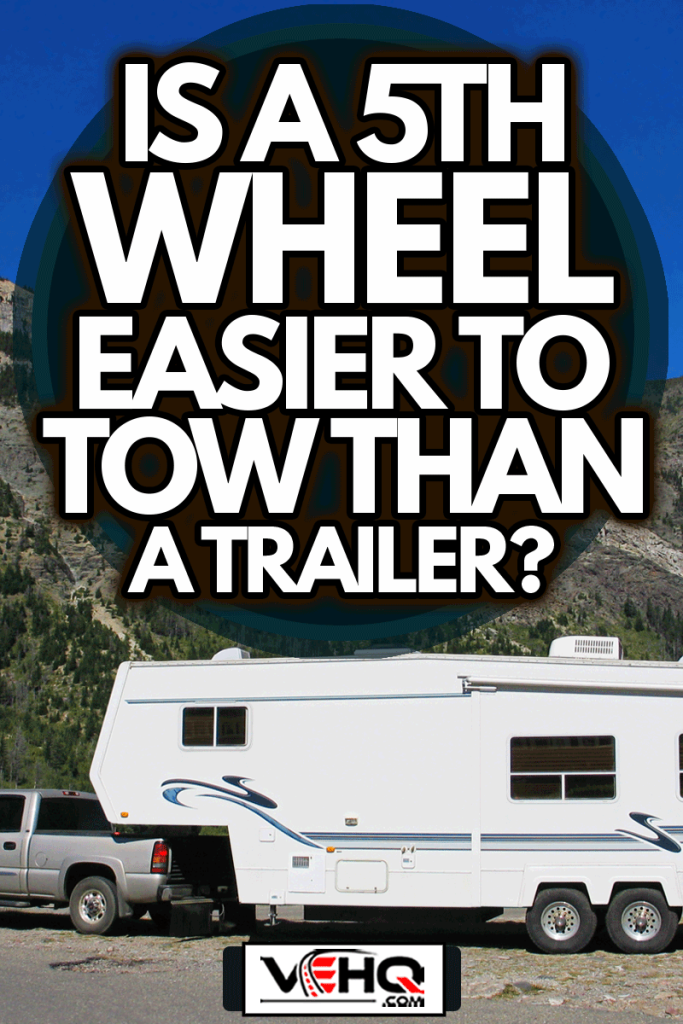
Fifth-Wheel Advantages and Disadvantages
We've seen that fifth-wheels typically have an advantage when it comes to towing. However, there are other factors to consider when choosing whether to go with a fifth-wheel or a bumper-pull trailer.
First, let's look at the good news. Fifth-wheels offer a lot of pros, but here are some of the highlights:
- Easier to tow
- Typically more spacious
- Include more amenities
- More storage
Of course, there are also some downsides to fifth-wheels when compared with travel trailers. These are some of the cons when it comes to fifth-wheels:
- Require a pickup truck to tow
- Heavier than most trailers
- Worse gas mileage
- More expensive
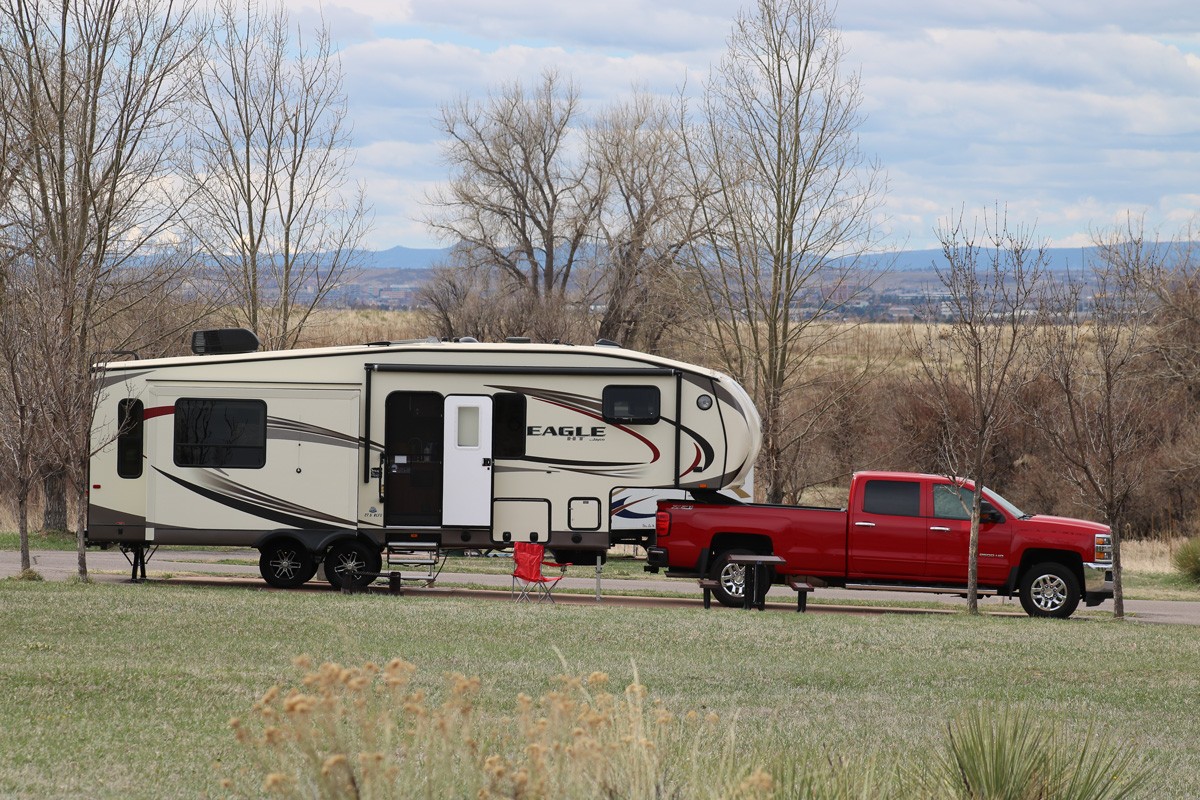
Travel Trailer vs Fifth Wheel for Full-Time Living
Now that we've seen some of the pros and cons with fifth-wheels, let's see how they compare in terms of full-time living.
In general, you'll be better off choosing a fifth-wheel for full-time living. The advantages of a fifth-wheel, such as increased living space, storage, and finer amenities, are especially important in this context.
This isn't to say that you can't also live full-time in a travel trailer. However, you are more likely to need to give up certain comforts.
If you can commit to full-time trailer living, you'll enjoy the reduced costs that trailers have. This doesn't just include the upfront costs, but also the savings at the pump due to the lighter weight of most trailers.
However, this only applies if you commit. If you try and then decide to switch to something more luxurious later, you'll end up paying more in the end.
Tips for Towing with a Fifth Wheel
Towing a fifth wheel may have its advantages over towing a trailer, but that doesn't mean it's a walk in the park either.
Whether you're an experienced tower or completely new to the game, it's good to follow some tips to help you tow safely, smoothly, and successfully.
Have a Partner Help When Possible
An extra set of eyes are invaluable for a lot of the processes involved with your fifth wheel. In particular, hitching and backing up are a lot easier to accomplish when you have a partner to guide you.
Choose your partner wisely, as fewer things will test your and your partner's patience like backing up your fifth wheel into a spot.
Perform an inspection each time you hit the road
Even if you've hitched up a million times, it's still possible to overlook something. This is why it's important to check all of your connections, your lights, and your tire pressure before you go.
Start Slow
If you're new to towing or towing a new vehicle, it's always best to start slow. Every fifth wheel handles differently, so you want to get a feel for how it turns and brakes, how it handles inclines, and more.
Leave Plenty of Space
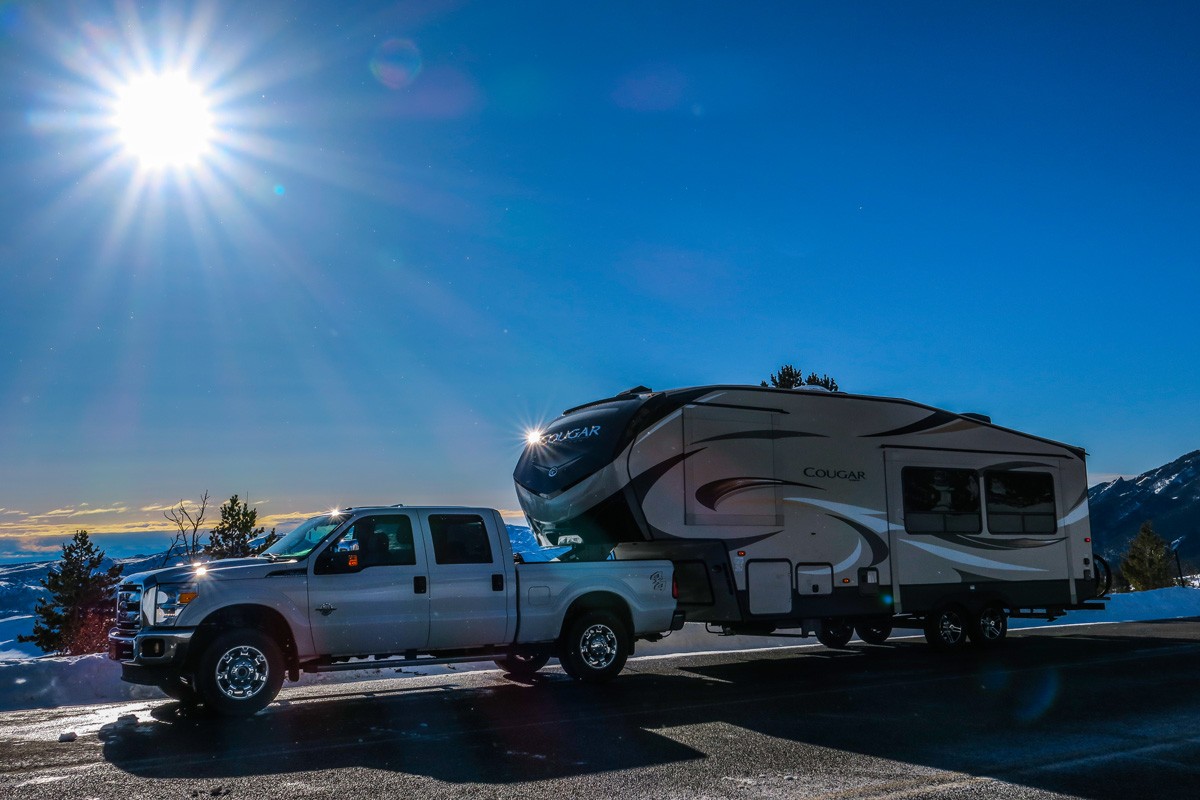
This tip goes along with going slow in that it's especially important when getting started. Make sure there's plenty of room between you and the vehicle in front of you so that if you suddenly have to hit the brakes, you won't plow through them.
Also make sure you take turns wide, even wider than you think you need to at first. Even though fifth wheels can generally handle tighter turns than bumper-pull trailers, you'll still need some extra space.
Of course, there are more tips you should keep in mind when towing a fifth wheel. Learn more about them in this article:
30+ 5th Wheel Towing Tips for Beginners
How to Hitch a Fifth Wheel
Fifth wheels don't hitch the same way that bump-pull trailers do, and it can take some getting used to when you start. We'll go over the steps and link a helpful video to get you started.
Secure the Fifth Wheel
Remember to keep your fifth wheel on level ground and to chock the wheels. This will help prevent your fifth wheel from rolling away as you hitch it.
Back your truck up to the trailer
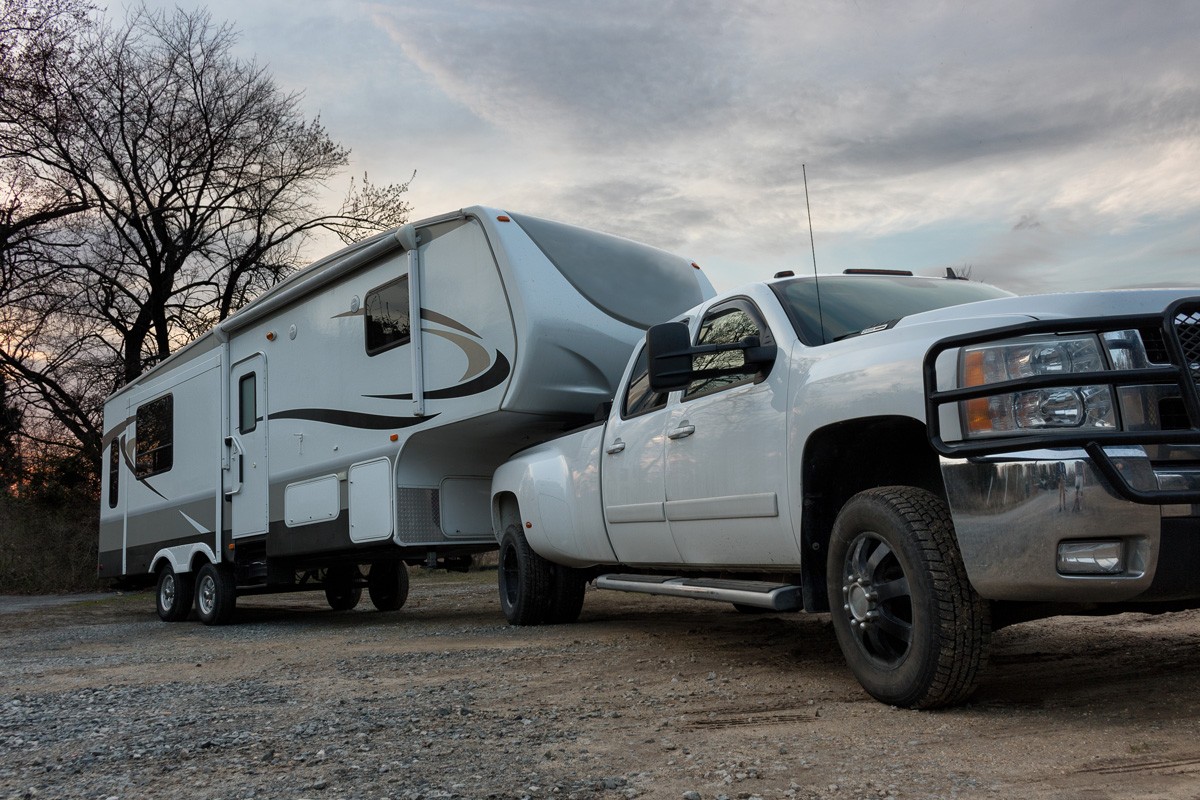
Next, you'll lower your tailgate and start backing up your truck to the fifth wheel. You want to get the coupler close to the kingpin and aligned. This is much easier if you have a partner who can guide you.
Adjust the height of the kingpin
With the coupler and kingpin close, you'll want to open the coupler and adjust the height of the kingpin so that it's level or just below the coupler. This is usually done by adjusting the fifth wheel's jacks.
Backup again to connect the truck and fifth wheel
Now, once again, you'll want to back up your truck. Take your time and go slow. You want to back up until the kingpin engages the coupler's jaws. This may require some more height adjustments on the fifth wheel.
Now you can lock the kingpin in the coupler with the locking bar and the safety latch.
Connect the Other Components
Connect the power chord and the breakaway switch to your pickup and close the tailgate.
Lift the landing gear and give try out the connection
Now you can raise the landing gear off the ground. You should give it a test, pulling slightly forward to make sure that everything is secure.
Finish lifting the landing gear
Now you can finish lifting your landing gear. Lift the jacks and stow the landing gear and chocks.
Make sure you do a full check of your truck and fifth wheel before hitting the road!
You can see the process for both hitching and unhitching your fifth wheel in the video below from RV Education 101
Smallest Fifth-Wheel RVs
While fifth-wheels are generally easier to tow than trailers, trailers generally take the cake when it comes to lightweight models. However, that's not always the case.
We've put together some of the lightest fifth-wheels on the market for your consideration.
The Scamp 19'
Minnesota-based Scamp has been in the RV game since the 70s. They specialize in custom-made, lightweight trailers in a variety of sizes, from 13 feet up to 19.
While the 13 and 16-foot trailers are only available in bumper-pull models, their 19-foot RV is a proper fifth-wheel. However, it starts from a dry weight of just 2,000 lbs, although yours can weigh more depending on the options you select.
This makes the Scamp 19-foot fifth-wheel a great choice for those with smaller trucks or for those who want a fun RV that won't drastically reduce their fuel efficiency.
Despite its diminutive weight, the Scamp doesn't skimp when it comes to amenities.
It's available in three floorplans, all of which include a sleeping area over the bed of the truck, a kitchen with a refrigerator and stove, a dinette that converts into a sleeping area, and a bathroom with a toilette and shower.
You can check out the Scamp or order your own on their website.
You can also see the Scamp 19-foot fifth wheel in action in the video from the manufacturer below:
Escape 5.0
If you like the Scamp but would be willing to haul a little more weight for a little more space, then the Escape 5.0 is a great choice for you.
It has a similar layout and features to the Scamp but comes in a more spacious package. The extra space does come with some extra weight, starting with a dry weight of 3,910 pounds.
The Escape 5.0 currently only features one floorplan, but it's available in three different finishes. Contemporary is a white interior with, as you may have guessed, a modern feel. For a warmer feel, you can opt for the blond Maple or tan Oak interiors.
Learn more about the Escape 5.0 or order your own on their website.
You can also see a walkthrough in this video from the manufacturer:
Dune Sport 24'
When you think of fifth-wheel toy haulers, you probably don't expect to find anything light. Arizona-based Dune Sport has proved that it can be done.
They offer custom-made fifth-wheel toy haulers starting at 24 feet in length. They offer 24-foot fifth-wheels in three different floorplans, each featuring a garage and each with a dry weight of 6,460 pounds.
While this makes them the heaviest on our list, this is still extremely light for a fifth-wheel, let alone a toy hauler.
See one of their 24-foot fifth-wheels for yourself in the video below:
Hitting the Road
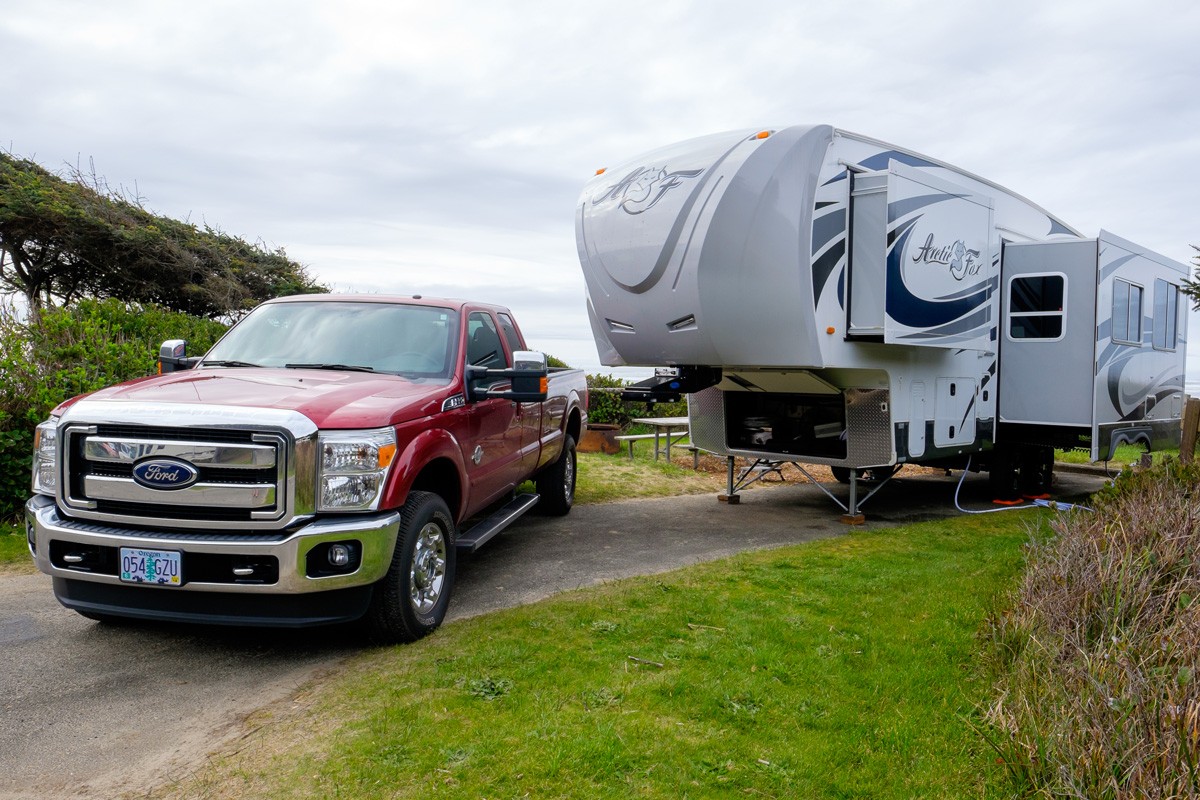
We hope that you've learned more about fifth wheels whether you're a prospective buyer or a long-time enthusiast.
We've seen tips for hitching and towing fifth wheels, the advantages and disadvantages of their design, and even taken a look at some of the lightest on the market.
If you found this article helpful, be sure to check out these great posts:
